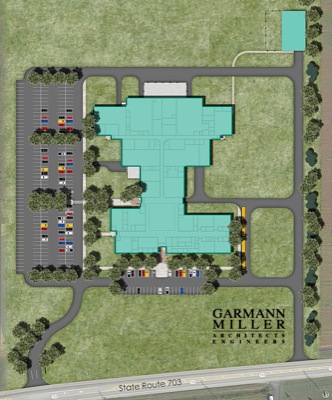Wednesday, July 20th, 2016
Second house taking shape
By William Kincaid
CELINA - House of Hope organizers are gearing up for a huge 2017 with the opening of a second faith-based, sober-living facility and plans for a new entity to further assist recovering addicts once they leave the homes.
Ministry member Bruce Swonger updated Celina Rotarians on the progress of the second House of Hope that will accommodate men.
The home is being constructed by the volunteer group St. John Builders of St. John Lutheran Church, Celina, on county-owned land just west of the women's home at 4874 Mud Pike.
Organizers originally had planned to place the facility between the sheriff's office and Foundations Behavioral Health Services along state Route 29. That plan changed due to drainage issues and other factors. Six residents in the nearby Silver Lakes subdivision had voiced concern about having the men reside so close to a neighborhood full of children, Swonger said.
The building should be finished in December and open in January, he added. It will be similar to the women's house and contain three bedrooms, with the men pairing up in rooms.
Asked about having men and women addicts living so close to one another, Swonger said any men or women found to be at the other home will be automatically evicted.
"You don't come back," he said.
Furthermore, just as at the women's house, the men's facility will have cameras recording 24-7, he said.
"We've actually not had any problems whatsoever," Swonger said about the women's facility. "These people, they're not bad people ... They're good people. They just made bad decisions."
Organizers are seeking to raise $100,000 to pay for material costs. So far, about $80,000 has been donated, Swonger said.
"The money poured in quite well in the beginning. It has slowed a little bit, but I think as people see the progress of the house going up, the money will come in," he said.
Swonger said The Ohio Department of Mental Health & Addiction Services had offered to provide $100,000 for the project, but the House of Hope board declined the state money to continue operating its ministry as it has been.
"(A state official) said, 'we'll give you $100,000 if you'll be our guinea pig and we can kind of watch you,' and our board met about it and we said, 'we're not really interested right now. We're doing OK by ourselves,' " Swonger said. "It's just interesting. They wanted to give us $100,000 because the law enforcement, drug court and the House of Hope in Mercer County is doing better than any other county in the state of Ohio."
Also next year, organizers hope to create another entity to help the recovering addicts once they leave the House of Hope, Swonger said. He did not provide details.
Once the women leave the facility, there's "no community (plan) for them. There's nobody there to take the baton and take them on down the street," Swonger said. Some of the women are falling into bad habits, though not necessarily relapsing with heroin, he said.
With the House of Hope's volunteers busy with the men and women in the sober-living houses, another entity will need to provide that additional support, Swonger said.
"We're going to need another entity or group of people that will take these folks, potentially for the rest of their lives," he said. "These people just need somebody, Big Brother Big Sister kind of thing."
Just like the women's home, the men's facility will provide a stable environment free of drugs and alcohol to help its occupants achieve long-term sobriety and independent living and become contributing members of society. Random and weekly drug tests are administered.
The women's house opened in December 2014, in part, to help the growing number of local people fighting heroin addiction. It is operated in partnership with the county's drug court and other organizations.
Applicants are referred from rehabilitation, the county jail and prison. Some seek residency by themselves. After filling out a six-page application, the candidates are vetted by a six-person interview commitee that includes two ex-addicts who have been clean for more than 12 years.
"They pick winners," Swonger said. "Out of 30 people we've probably taken 10."
Once accepted into the house, the women must get a job within 30 days and begin paying rent, anywhere from $50 to $200 a month, Swonger said.
"We're not trying to make money, but they have to learn how to budget so when they get out on their own it's not a complete new area," he said.
Participants must stay in the five-phase program for at least eight months and up to two years. The women receive more free time and privileges as they meet the standards for each phase. The women take classes about budgeting, Bible study, resumes and job interviews.
All donations go directly toward the home, Swonger said, noting there's no administrative cost. The home costs about $1,500 per month to operate.
"This thing's a lot bigger than I ever thought it would be, and we've got to give God credit for it, because he's pulled the community together, he's pulled the people together and he's done things that we would not be able to do," he said
A bevy of companies and individuals have provided for everything from trash, telephone and internet services, to food, utensils and other materials, he said.
"We received no grants nor government funding. It's all funding by the folks of Mercer County," Swonger said.

